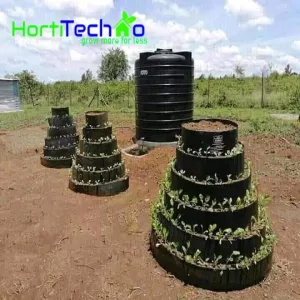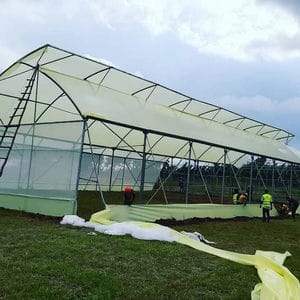What is of a Multi-Storey Garden?
A multi-storey garden, also known as a vertical garden, is a type of garden that grows plants vertically instead of horizontally. It involves growing plants on a structure with multiple levels, rather than on the ground. Multi-storey gardens come in various types, from simple trellises to complex hydroponic systems.If you're interested in growing your own vegetables and herbs but have limited space, a multi-storey garden is a great option. In this article, we'll explain what a multi-storey garden is, why it's an excellent choice for those in Kenya, and what factors to consider when selecting one.
Our multi-storey garden is the perfect solution, with prices starting at just K.sh 1500. Enjoy the benefits of fresh, delicious and healthy plants, all while maximizing your space
Specification:
A multistorey garden is a vertical garden that can be installed indoors or outdoors.
- It consists of multiple layers or tiers of planting beds stacked on top of each other, typically supported by a sturdy frame or structure.
- The garden can be customized to suit the available space, with various sizes and shapes available to fit any area.
- The planting beds are usually made from lightweight materials such as PVC, foam or felt, and are designed to hold soil or a soil-less growing medium.
- The garden can be watered either manually or through an automatic drip irrigation system.
- Plants that can be grown in a multistorey garden include a variety of herbs, vegetables, and ornamental plants.
- Benefits of a multistorey garden include maximizing space, improving air quality, and reducing stress levels.
With prices starting at just 1500 KSH, a multistorey garden is an affordable and sustainable way to add greenery to any space.
Advantages of a Multi-Storey Garden in Kenya
With a rapidly growing population in Kenya, space is becoming limited, making it challenging for people to grow their own food, especially in urban areas with limited access to land. Multi-storey gardens offer a great solution by enabling people to grow their own food in small spaces.
Moreover, multi-storey gardens can help conserve water, which is a crucial consideration in Kenya. Many multi-storey gardens use hydroponic systems that use less water than traditional gardening methods.
Factors to Consider When Choosing a Multi-Storey Garden
When selecting a multi-storey garden, several factors come into play, including:
Size: Multi-storey gardens come in various sizes, so it's vital to select one that fits your space and requirements.
Materials: Multi-storey gardens can be made from different materials such as wood, metal, and plastic. It's essential to consider the durability and environmental impact of the materials used.
Cost: Multi-storey gardens have a broad price range, from a few hundred to several thousand dollars. It's crucial to choose one that fits your budget.
Maintenance: It's crucial to consider how much maintenance the garden will require since some systems require more upkeep than others.
Multi-storey gardens are an excellent option for those who want to grow their own vegetables and herbs but have limited space. When it comes to choosing profitable plants for a multi-storey garden, there are several factors to consider, such as the plant's growth rate, yield, and market demand. Here are some profitable plants to consider for a multi-storey garden:
Leafy Greens: Plants such as lettuce, spinach, and kale are high-yielding crops that are in high demand. They also have a short growing cycle, making them a good option for a multi-storey garden.
Herbs: Herbs such as basil, mint, and cilantro are popular crops that can be sold fresh or dried. They also have a high yield per square foot, making them a profitable option for a multi-storey garden.
Tomatoes: Tomatoes are a high-value crop that can be grown in a multi-storey garden. They require a trellis or stake for support, making them ideal for vertical growth.
Strawberries: Strawberries are a profitable crop that can be grown in a multi-storey garden. They are high-value and have a high yield per square foot.
When it comes to irrigation for a multi-storey garden, there are several methods to consider. Drip irrigation is a popular method that delivers water directly to the roots of the plants, reducing water waste and minimizing the risk of disease. Another option is hydroponic irrigation, which uses a nutrient-rich water solution to grow plants vertically without soil. This method also conserves water and can result in higher yields.
multi-storey gardens can be a profitable venture if the right plants are chosen and proper irrigation is implemented.
In conclusion, multi-storey gardens offer an excellent option for people in Kenya who want to grow their own food but have limited space. They can also help conserve water and can be made from different materials.
When selecting a multi-storey garden, consider the size, materials, cost, and maintenance requirements to choose the best fit for your needs.
At Hortitechno, we have a variety of multi-storey gardens for sale that can meet your specific requirements. Greenhouse and Irrigation Solutions for Kenya
Welcome to Hortitechno, where you can find multi-storey gardens for sale in Kenya.



.png)


 20%
20%



0 Reviews
Your rating